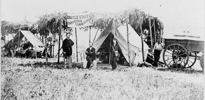 During the course of the Civil War over 5,000 delegates of the U.S Christian Commission volunteered to serve the soldiers of the Union army on the battlefields and hospitals. When the opportunity arose they served the soldiers in grey as well. In addition to raising money and volunteers to serve soldiers in the name of Christ, they shared the gospel message boldly, distributing over:
During the course of the Civil War over 5,000 delegates of the U.S Christian Commission volunteered to serve the soldiers of the Union army on the battlefields and hospitals. When the opportunity arose they served the soldiers in grey as well. In addition to raising money and volunteers to serve soldiers in the name of Christ, they shared the gospel message boldly, distributing over:
1.46 million bibles
39 million pages of bible tracts
8.9 million religious knapsack books
18 million christian newspapers
1.4 million hymn books and psalm books
over 7 million pages of stationary and envelopes for letter writing
$4 million worth of stores including food, medical aid and clothing
The Christian Commission was organized around eight general principles which might be instructive to us as we build movements everywhere:
1. Catholicity–the universal church of various names united in behalf of men of every state
2. Nationality–ensure that there is “freedom from sectionalism or favoritism in the distribution of stores…give breadth to the resources of supply and practice equality in application of those resources
3. Voluntariness–everyone gives their services…”freely received, freely given.”
4. Combination of Benefits for Body and Soul–John Wesley’s followers in the British Army had only served the souls of men; Other agencies focused just on the body. “The Christian Commission alone, and first since the world began, was a national agency embracing man as mortal yet immortal. . .”
5. Reliance upon Unpaid Delegates–The Commission’s delegates worked in an apostolic spirit, for apostolic pay. They were armed, not with power of miracles for all maladies, but with both stores and publications for all wants of the body and mind.
6. Personsal Distribution with Personal Ministrations–All stores (bibles, medical aid) were distributed personally, if possible, by delegates to the soldier. The personal touch added greatly to the value of the gift.
7. Principle of Co-Operation–Delegates were to cooperate under all circumstances with chaplains, surgeons and army officers.
8. Respect for Authority–Delegates were strictly enjoined, in the prosecutions of their religious duties, to offer every possible assistance to chaplains, but never to intrude uninvited into their domain.
Leave a Reply